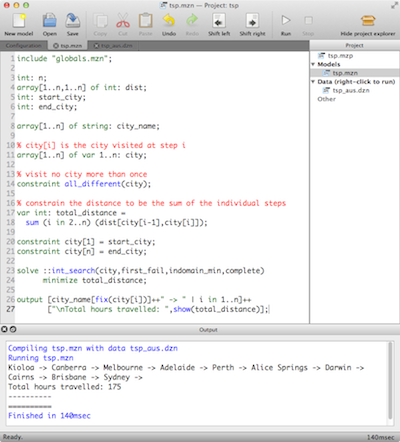- Add new builtin functions for array manipulation:
select_from_index_Xcan slice an array with a non-contiguous set of indices, andconcat_index_Xcan concatenate two arrays along a specified index. - Add option type versions of bin packing and cumulatives constraints.
- Remove
bool_xorwith two arguments from the FlatZinc builtins. It is never output into FlatZinc by the compiler and violated the rule that FlatZinc builtins are not overloaded (issue 913). Also remove some other duplicates and incorrect overloads fromflatzinc_builtins.mzn. - Add includes for header files where symbols are required, in order to avoid issues with some compilers.
- Fix AST string allocation to avoid warnings about writing into unallocated memory.
- Fix float literal parsing, making it consistent across all platforms (issue 941).
- Plus 15 bugfixes!
Downloads
Official binary packages are provided for Windows, macOS and Linux.
These contain MiniZinc 2.9.4, the MiniZinc IDE 2.9.4, as well as several state of the art solvers.
For detailed installation instructions, see the documentation.
Windows
Windows 10 or later, 64-bit processor.
MiniZincIDE-2.9.4-bundled-setup-win64.exemacOS
macOS 11 or later, universal binary.
MiniZincIDE-2.9.4-bundled.dmgLinux AppImage
AppImage for 64-bit Linux (tested on Ubuntu 22.04).
MiniZincIDE-2.9.4-x86_64.AppImageLinux Snap package
Snap package for 64-bit Linux.
View on the Snap storeLinux binary archive
Binary archive for 64-bit Linux (tested on Ubuntu 22.04).
MiniZincIDE-2.9.4-bundle-linux-x86_64.tgzSource code
Source code is available from the GitHub repositories.
View on GitHub
Both the compiler tool chain and the IDE are available as free and open source software.
Have a look at our License Information page for the details.
The MiniZinc compiler and IDE
The compiler is the heart of the MiniZinc tool chain. It translates constraint models into FlatZinc, a language that is understood by a wide range of solvers.
MiniZinc comes with a simple Integrated Development Environment, the MiniZinc IDE, which makes it easy to develop and run constraint models.
Solvers
A number of solvers are included in the official binary packages:
MiniZinc can also interface with the following solvers if installed:
Additionally, many other compatible solvers can be installed, including:
Note that if you build MiniZinc from source, you will have to install any desired solvers yourself.

Reporting issues
We are grateful for feedback on MiniZinc, including bug reports, feature requests and ideas for improvements.
For general discussions about MiniZinc, please use the discussion forum.
To report an issue, please use the following issue trackers:
Releases
The latest release of MiniZinc is version 2.9.4, released 29 September 2025.
Development builds
Unstable development builds with upcoming bugfixes and features are available on GitHub.
Documentation for the latest development version of MiniZinc is available here.
For a list of bugfixes/changes please refer to the changelog.
Previous releases
- MiniZinc 2.9.3 (released 23 May 2025, change log)
- MiniZinc 2.9.2 (released 6 March 2025, change log)
- MiniZinc 2.9.1 (released 3 March 2025, change log)
- MiniZinc 2.9.0 (released 11 February 2025, change log)
- MiniZinc 2.8.7 (released 2 October 2024, change log)
- MiniZinc 2.8.6 (released 25 September 2024, change log)
- MiniZinc 2.8.5 (released 3 June 2024, change log)
- MiniZinc 2.8.4 (released 10 May 2024, change log)
- MiniZinc 2.8.3 (released 1 February 2024, change log)
- MiniZinc 2.8.2 (released 15 December 2023, change log)
- MiniZinc 2.8.1 (released 27 November 2023, change log)
- MiniZinc 2.8.0 (released 16 November 2023, change log)
- MiniZinc 2.7.6 (released 20 June 2023, change log)
- MiniZinc 2.7.5 (released 7 June 2023, change log)
- MiniZinc 2.7.4 (released 11 May 2023, change log)
- MiniZinc 2.7.3 (released 20 April 2023, change log)
- MiniZinc 2.7.2 (released 5 April 2023, change log)
- MiniZinc 2.7.1 (released 31 March 2023, change log)
- MiniZinc 2.7.0 (released 23 February 2023, change log)